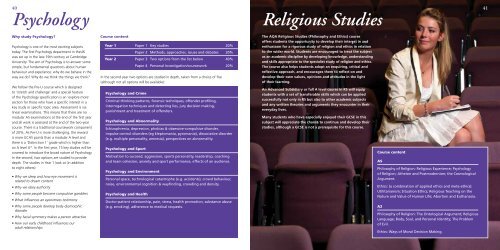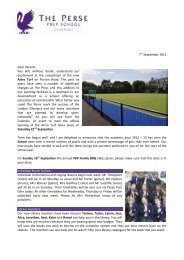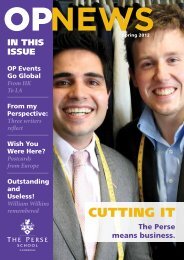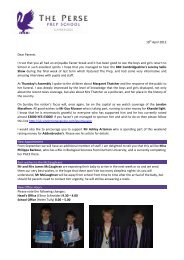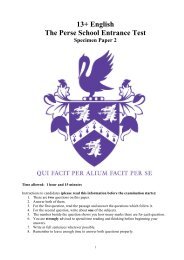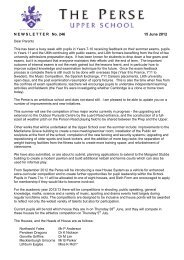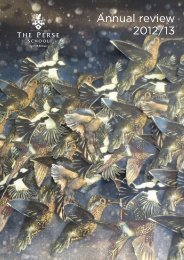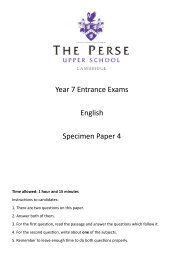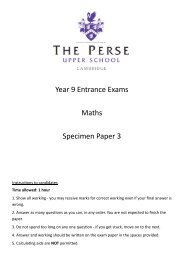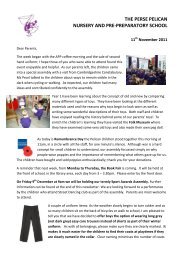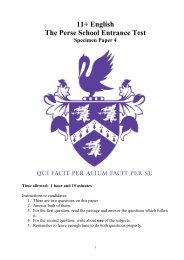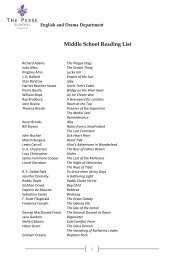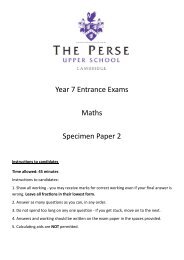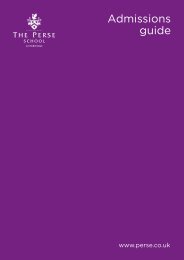Sixth Form Prospectus - The Perse School
Sixth Form Prospectus - The Perse School
Sixth Form Prospectus - The Perse School
Create successful ePaper yourself
Turn your PDF publications into a flip-book with our unique Google optimized e-Paper software.
40 41PsychologyReligious StudiesWhy study Psychology?Psychology is one of the most exciting subjectstoday. <strong>The</strong> first Psychology department in theUKwas set up in the late 19th century at CambridgeUniversity. <strong>The</strong> aim of Psychology is to answer somesimple, but fundamental questions about humanbehaviour and experience: why do we behave in theway we do? Why do we think the things we think?We follow the Pre-U course which is designedto ‘stretch and challenge’ and a special featureof the Psychology specification is an ‘explore more’section for those who have a specific interest in akey study or specific topic area. Assessment is vialinear examinations. This means that there are nomodular AS examinations at the end of the first yearand all work is assessed at the end of the two-yearcourse. <strong>The</strong>re is a traditional coursework componentof 20%. As Pre-U is more challenging, the rewardis more UCAS points than a modular A level andthere is a ‘Distinction 1’ grade which is higher thanan A level A*. In the first year, 15 key studies will becovered to introduce the broad nature of Psychology.In the second, two options are studied to providedepth. <strong>The</strong> studies in Year 1 look at (in additionto eight others):• Why we sleep and how eye movement isrelated to dream content• Why we obey authority• Why some people become compulsive gamblers• What influences an eyewitness testimony• Why some people develop body dysmorphicdisorder• Why facial symmetry makes a person attractive• How our early childhood influences ouradult relationshipsCourse contentYear 1 Paper 1 Key studies 20%Paper 2 Methods, approaches, issues and debates 20%Year 2 Paper 3 Two options from the list below 40%In the second year two options are studied in depth, taken from a choice of five(although not all options will be available):Psychology and CrimePaper 4 Personal Investigation/coursework 20%Criminal thinking patterns, forensic techniques, offender profiling,interrogation techniques and detecting lies, jury decision making,punishment and treatment of offenders.Psychology and AbnormalitySchizophrenia, depression, phobias & obsessive-compulsive disorder,impulse control disorders (eg kleptomania, pyromania), dissociative disorder(e.g. multiple personality, amnesia), perspectives on abnormality.Psychology and SportMotivation to succeed, aggression, sports personality, leadership, coachingand team cohesion, anxiety and sport performance, effects of an audience.Psychology and EnvironmentPersonal space, technological catastrophe (e.g. accidents), crowd behaviour,noise, environmental cognition & wayfinding, crowding and density.Psychology and HealthDoctor-patient relationship, pain, stress, health promotion, substance abuse(e.g. smoking), adherence to medical requests.<strong>The</strong> AQA Religious Studies (Philosophy and Ethics) courseoffers students the opportunity to develop their interest in andenthusiasm for a rigorous study of religion and ethics in relationto the wider world. Students are encouraged to treat the subjectas an academic discipline by developing knowledge, understandingand skills appropriate to the specialist study of religion and ethics.<strong>The</strong> course also helps students adopt an enquiring, critical andreflective approach, and encourages them to reflect on anddevelop their own values, opinions and attitudes in the lightof their learning.An Advanced Subsidiary or full A level course in RS will equipstudents with a set of transferable skills which can be appliedsuccessfully not only in RS but also to other academic subjectsand any written theories and arguments they encounter in theireveryday lives.Many students who have especially enjoyed their GCSE in thissubject will appreciate the chance to continue and develop theirstudies, although a GCSE is not a prerequisite for this course.Course contentASPhilosophy of Religion: Religious Experience; Psychologyof Religion; Atheism and Postmodernism; the CosmologicalArgument.Ethics: (a combination of applied ethics and meta-ethics):Utilitarianism; Situation Ethics; Religious Teaching on theNature and Value of Human Life; Abortion and Euthanasia.A2Philosophy of Religion: <strong>The</strong> Ontological Argument; ReligiousLanguage; Body, Soul, and Personal Identity; <strong>The</strong> Problemof Evil.Ethics: Ways of Moral Decision Making.


